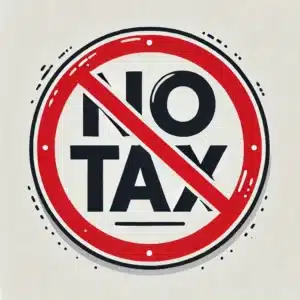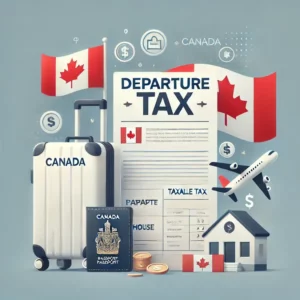This post outlines important information on Canada departure tax, or exit tax, for those who are leaving the country and turning into non-residents for tax reasons. When thinking about this move, it’s good to understand that you’ll be deemed an emigrant.
An emigrant is anyone who leaves and breaks off their residence links from their own nation to reside in another country.
Having dependents leave Canada, selling a house, and severing social ties are all part of this process.
If you are looking to invest as an expat or high-net-worth individual, which is what I specialize in, you can email me (advice@adamfayed.com) or WhatsApp (+44-7393-450-837).
This includes if you are looking for alternatives or a second opinion.
Some of the facts might change from the time of writing, and this content isn’t financial, legal, tax or any other kind of individual advice, nor a solicitation to invest.

What is departure tax in Canada?
The departure tax is imposed on individuals who stop being residents of Canada. It entails the deemed transfer of assets at fair market value.
Their taxable income includes half of any proceeds from this deemed sale, which are then subject to regular taxation.

Majority of deductions are available to emigrants from their stay in the country. However, relocation expenditures are typically not deductible unless certain requirements are met.
Their resident status may also prevent them from receiving some federal and provincial non-refundable tax credits.
Non Residency Status Canada
The latest of the following dates marks when individuals become non-residents for tax purposes:
- Their departure date from Canada.
- The departure date of their spouse or dependents.
- The date they become residents in a different nation.
Canada Departure Tax Reporting Requirements
Emigrants are required to disclose their non-resident status to Canadian payers and financial companies.
If they want to get a refund or owe taxes, they must file a Canadian tax return.
The tax package for the province in where they lived at the time of departure should be used for that year.
Along with their tax return for the year of departure, individuals are required to file Form T1243, which details the deemed transfer of property.
It is also necessary to file Form 1161 if the total value of the property exceeds CAD 25,000.
For the portion of the year they lived in Canada, emigrants are required to submit their worldwide income. They only declare income from Canadian sources after leaving.
Canada Departure Tax Exemptions

Some assets are free from exit tax, such as:
- Canadian real estate
- Inventory and business property
- Assets in registered accounts, such as tax-free savings accounts and registered pension schemes
Canada Departure Tax Payment and Deferral Options
The usual deadline for departure tax is April 30 of the year after leaving.
By submitting Form T1244, individuals can choose to postpone payment until they actually sell their assets or return to Canada.
It is necessary to offer sufficient security if the deferred tax surpasses 16,500 Canadian dollars.
Post-Emigration Considerations in Canada
If the new nation of residence also taxes capital gains, there may be foreign tax credits available.
Canada and numerous other nations have tax deals that can prevent double taxation. Emigrants who want to know their tax responsibilities in Canada and their new country of residency should refer to these treaties.
Returning to Canada
Under certain circumstances, repatriating residents have the ability to revoke the deemed sale and repurchase their possessions at fair market value.
Pained by financial indecision?

Adam is an internationally recognised author on financial matters with over 830million answer views on Quora, a widely sold book on Amazon, and a contributor on Forbes.



